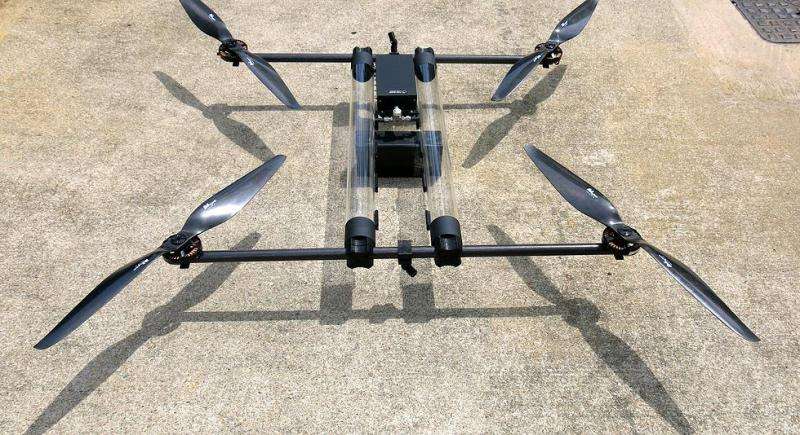May 20, 2015 weblog
Hycopter stores energy in form of hydrogen, not air

Singapore-based Horizon Unmanned Systems (HUS) this month introduced the hycopter, which they said is the world's first hydrogen fuel cell-powered multi-rotor UAV. It uses refillable hydrogen tubes as part of its structure.
Endurance is the key word. Its ability to travel longer distances on a single charge is highlighted. That means the 20 to 30-minute multi-rotor missions of today, said the company, can shift to flights lasting several hours at a time.
Aerial survey jobs can be done faster and drone delivery over longer distances can be considered as more feasible. Another advantage being promoted is low operational costs: at just $5/kWh for industrial hydrogen, said the company, one flight will only cost $7.50. As for the specs, the company lists endurance as up to four hours with no payload but 150 minutes with 1kg payload.
The hycopter is being readied for a flight endurance of four hours. The company said this is eight to 10 times the average flight duration of equivalent systems today.
The hycopter can store energy in the form of hydrogen instead of air, which eliminates energy storage weight. Less lift power is needed. The fuel cell turns the hydrogen into electricity to power the rotors.
The fuel cell was designed by sister company, Horizon Energy Systems. HUS was launched this year, to merge the energy systems coming from HES with UAV platforms built from the ground up. "By removing the design silos that typically separate the energy storage component from UAV frame development – we opened up a whole new category in the drone market, in-between battery and combustion engine systems," said CEO Taras Wankewycz. He said the hycopter was the first result of their efforts.
Wankewycz told Gizmag that "the flying prototype is almost ready to go, and should be making its first flight later this year."
Certainly this is not the last we will hear of hydrogen and fuel cell research. The Center for Hydrogen and Fuel Cell Research at the University of Birmingham focuses on applications and demonstrations of hydrogen and fuel cell systems. Research areas include microtubular solid oxide fuel cell power system development and integration into a mini-UAV.
Stephen Edelstein earlier this month in Green Car Reports, turning to battery and energy research, said that "fuel cells were "dogged by cost issues, and there are questions about how enough hydrogen to supply a large fleet of cars can be produced sustainably. The need to address these issues has led to a boom in research for both batteries and fuel cells."
Writing in the Wall Street Journal last year, Christopher Mims noted how "Drones are a special case of the limitations of current energy storage technology because, even more than in cars and other gadgets, there is a direct penalty for adding more batteries—the drone becomes heavier." If drones are going to prove viable for dropping off packages, their flight time will need to improve substantially, he said. Horizon's work could be an indicator that hydrogen fuel cell technology will draw attention in months to come.
More information: http://www.hus.sg/?utm_source=Composite+UAV+frame+stores+weightless+energy+%2F+multi-rotor+aims+for+4hr+flight
© 2015 Tech Xplore


















